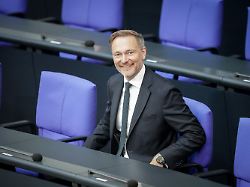No one seems to be really happy with Federal Finance Minister Lindner’s draft for the 2024 federal budget. The FDP chairman sees this as a good sign and is resolutely defending the budget plans in the Bundestag. Lindner rejects plans by the opposition and the red-green coalition partners.
It was a long way for Christian Lindner to finally step up to this desk. On Tuesday after the parliamentary summer break, the time has finally come: After months of quarrels in the governing coalition, the Federal Finance Minister and FDP Federal Minister can present his draft budget for 2024 and the medium-term financial plan up to 2024. The speech, which lasts around an hour, is primarily a reply to the criticism of the government’s own partners, who are rubbing shoulders with the 30 billion euros in savings. Expenses for the coming year would be “nominal” – i.e. not adjusted for inflation – 25 percent above the level of the pre-crisis year 2019. “So there can be no talk of a clear cut,” emphasized Lindner.
The Social Democrats and Greens in particular accused Lindner of a lack of investment power and social indifference, especially in the debate about basic child security and measures to counteract the economic crisis. Accordingly, Thomas Middelberg, who held the counter-speech for the Union faction, enjoyed pointing out the meager applause that Lindner received from the red-green faction benches. “You gave this speech here mainly for your own small group,” said Middelberg. In the traffic light there is a lack of unity and common concepts.
Lindner sees the power of action in the draft budget
In fact, Lindner focused on relegating criticism of an austerity budget to the realm of legend. 54.2 billion euros are available for infrastructure projects alone, such as the railways, digitization and the construction of roads and power lines. In 2019, this amount was still 38 billion euros. “The investment rate increases from 10 to 12 percent,” said Lindner. At the same time, the federal government has done a lot to relieve working people. Be it the tax-free inflation subsidy or tax relief. “A family of five with 55,000 euros in taxable income will pay 800 euros less this year than under the old tax law,” he said.
Lindner also referred to the decisions of the government cabinet during the most recent meeting in Meseberg. The traffic lights have decided on a program against “bureaucratic burn-out”, will boost the economy with the Growth Opportunities Act and thirdly: “We are strengthening the financing conditions for start-ups.” Lindner rejected criticism from the Union and AfD of “shadow budgets” in the form of special funds. “I warn against the instrument of the so-called special fund […] to criticize per se,” said Lindner. Special funds created “long-term planning security” for specific projects.
An iceberg? Many!
But Lindner makes no secret of the fact that savings have to be made. His arguments are largely similar to those of Chancellor Olaf Scholz, his predecessor in the Ministry of Finance. “With our current budget strategy, we will be able to return to the pre-crisis level of national debt much faster than some people believe today.” This made it possible for Germany to counteract the crisis with massive expenditure. “Our country is the gold standard in state financing,” Lindner picked up one of his favorite phrases.
This gold standard is threatened in the medium term. Germany needs “from 2028 every year 12 billion euros to repay the corona loans”. In 2028, the Bundeswehr special fund will be repaid, and in 2031 the loans for last year’s energy price support will be paid off. All of this must be taken into account in medium-term financial planning up to 2027. “Behind the horizon line, not yet visible to us, there is an iceberg, not to say an iceberg field,” said Lindner, indirectly comparing Germany with the “Titanic”. “We have a responsibility not to wait until the iceberg has come from the horizon in front of the bow.” The iceberg will not change course, budgetary policy must change. “Two-thirds of the budget will be tied up in 2024 for staff and social spending and interest costs.” This leaves little room for creativity.
No investments on credit, no industrial electricity price
In view of this savings requirement, Lindner rejected several proposals from other parties. “If we were to set up economic stimulus programs on credit, combating inflation would take longer and be more expensive for our economy,” said Lindner, particularly in the direction of the Greens. “That’s why we don’t do it.” The Greens, like the SPD parliamentary group, but not the chancellor, are calling for a limited subsidy of the industrial electricity price. Lindner said this type of aid created false incentives and economic distortions. Only more energy offers would permanently lower the electricity price for everyone.
And Lindner also immediately expelled an idea from the Union: “I warn against a debate about raising the top tax rate,” said the FDP leader. “Income tax is the business tax for countless companies.” The top tax rate affects small businesses, the self-employed and freelancers and not just rich football professionals.
Overall, Lindner is demonstratively at peace with himself. “Not everything is financed the way you want it to be,” he said, before trying to joke: “When the criticism comes from all sides, the result seems more balanced than if only one side complained. ” That seems plausible, but it is already foreseeable that the government factions will continue to wrestle fiercely over details in the coming days. And it’s not just the SPD and Greens who have requested changes. The morning before Lindner’s speech, his general secretary, Bijan Djir-Sarai, announced on ntv that he wanted to extend the reduction in VAT in the catering trade, which expires at the end of the year. Budget week has begun.
